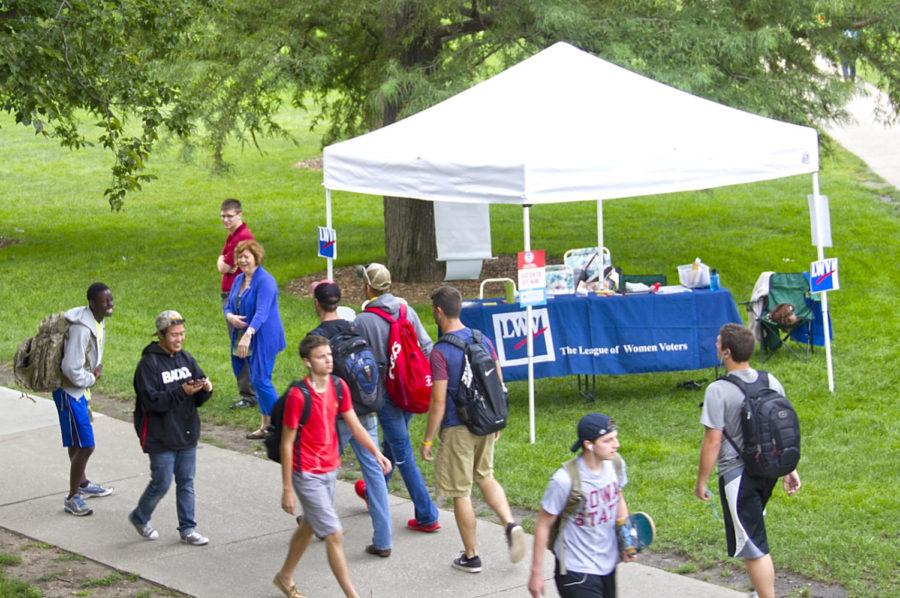GSB Senators encourage early voting among students
Students are being targeted to register early to vote in the elections in November. Because the voting lines can get long, it can discourage students from casting their votes. GSB Senators and the Ames League of Women Voters stress the importance of college votes.
September 16, 2014
ISU students — both those heavily involved in political processes and those who are unfamiliar with elections — will have a chance to register early.
In an effort to engage students in voting processes, members of Government of the Student Body and the Ames League of Women Voters will be registering students 9 a.m. to 3:30 p.m. outside of Parks Library. Another event Sept. 23 will allow students to register early.
“The lines on election day get kind of long because of same-day registration,” said Justin Bahr, director of governmental relations for GSB. “I guess a couple of people had to wait a couple of hours last year to vote, which can kind of disincentive you to vote. That’s too bad if you don’t have time to vote … [when] you can’t always do that in the rest of the world.”
Bahr said the purpose of Sept. 17’s event is to keep voting lines short in November and to encourage students to take part in the voting process.
Bahr said the early registration event is a bipartisan effort, and brochures with backgrounds on candidates for the gubernatorial and senate races will be available. The brochures will not feature information on where each candidate stands on particular issues so as not to influence students’ votes and to encourage them to do their own research.
Students who wish to register for local elections will need to register with their Ames address. Bahr also said resources and absentee ballots will be made available for students who wish to vote in their home state’s elections.
Bahr said it is important to him and the Ames League of Women Voters — which was started by Carrie Chapman Catt, an ISU graduate who became influential in the women’s suffrage movement — to vote because college students are often a target for political parties because they are both very passionate about issues and impressionable.
“They mentioned how important it is from their point of view to get involved because at one point they didn’t have the opportunity to vote,” Bahr said of the Ames League of Women Voters. “Sometimes to get students to vote, they’ll ask them, ‘What if you couldn’t vote?’ It would change your mind a little bit.”
Kathryn Leidahl, sophomore in pre-business, is also working to get students to understand the importance of voting.
Leidahl created SparkVote as part of the Campus Election Engagement Project.
“The lowest demographic for voters are the people that are between the ages of 18 and 24 — that’s prime college age. I thought to myself, ‘Why aren’t these kids voting?’ There has to be something, maybe politics is going over their head or they think it’s too complex,” Leidahl said about why she championed the voting cause.
SparkVote will be based on the interface of SparkNotes that Leidahl said would be familiar and easy to use for students. The website will feature the who, what, where and when for the upcoming midterm election candidates and races, as well as future races.
“What some people don’t realize is that the 18 to 25 demographic we’re trying to capture with this program is actually bigger than our baby boomer generation that everybody seems to be very concerned about,” Leidahl said. “Getting them to be politically active at a young age will help carry them through a very political lifestyle. Hopefully they will pass it down to their children.”
The website will be launched in October and an informational pamphlet will be handed out at the early registration event Sept. 17. Leidahl said other public and private universities have been introduced to SparkVote.
Leidahl also said she believes college students need to be informed and take part in elections because they represent the future voters and taxpayers.
“I just think it’s important for college students to know what kind of impact voting will have on their future, on their career path,” Leidahl said. “I think it’s important for college students to realize that have an impact on policies and their communities by voting for these representatives.”
As for students who don’t think their vote will make a difference, Bahr said that is simply untrue.
“If we all think that, we’re not going to do very good,” Bahr said. “Not all Americans vote, but if they did they would make a difference.”







